I was going to give you this big macro rundown of what happened since the payroll number, but I changed my mind. Anybody can give you the play-by-play. Let’s talk about it in the context of true contrarian investing.
Being contrarian doesn’t just mean doing the opposite of what everyone else is doing. It means doing what is really unpopular and may make you subject to ridicule.
If you went on CNBC before the payroll number and said that you were a raging emerging markets bull, they would have put the clown nose on you and given you the hook.
And yet…
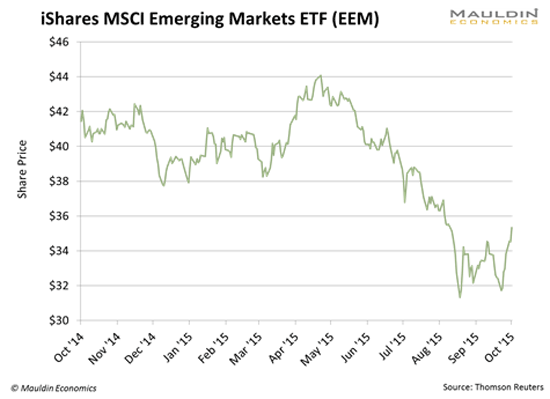
This may not seem like a big deal to you. If you are an individual investor, you can have the iShares MSCI Emerging Markets Index ETF (EEM) in your portfolio and lose money on it, and the only one who cares is you.
But if you run a mutual fund or a hedge fund, you have to file a 13F and then everyone can see EEM in your portfolio, and you have to explain to your investors why you have this dumb EEM position that everyone hates and that’s obviously going down—and if you lose money on indefensible things, it becomes difficult to defend your continued employment.
For example, if Nike (NKE) were to miss earnings and gap lower 15%, nobody would get fired, because everyone owns it.
But if you go down with the emerging markets ship, you are definitely getting fired.
So being a contrarian is hard if you’re a professional, because if you are wrong, you are wrong publicly, and you experience shame, and as we said before, shame is the most powerful motivator.
I did not pick up my moniker The 10th Man by accident. Do you know where it came from? It came from the zombie movie World War Z.
Spoiler alert: In the movie, Israel survived the zombie invasion because they employed a 10th man whose job it was to disagree when everyone else agreed. Israeli intelligence intercepted emails from India saying that they were being attacked by “undead,” literally, zombies.
Everyone in Israeli intelligence figured that the Indian government was using the word “zombies” to refer to something else.
The 10th man said, “What if they are actually talking about zombies?”
Leading up to the payroll number, we got a lot of ultra-bearish articles hitting the tape, but the Big Kahuna was the slickly produced Carl Icahn video, Danger Ahead, whose release perfectly coincided with the low tick in stocks.
His argument was compelling, as it always is. But the bearish argument is always most compelling on the lows.
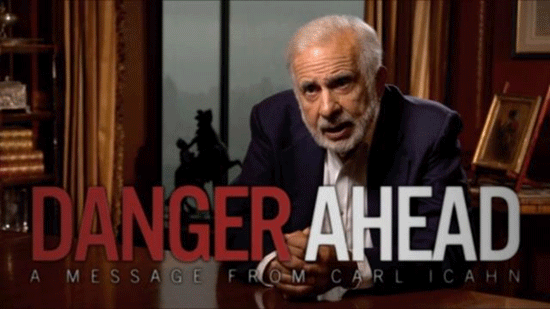
It’s tough to take the other side of Carl Icahn. His market timing is almost as legendary as his activist investing.
Here’s the point: If Carl Icahn comes out with this video on the highs, he gets the clown nose and the hook. If he comes out with it on the lows, he sounds like a freaking oracle.
It takes a lot of guts to publicly call Carl Icahn a loser. That’s what I did in my professional publication, The Daily Dirtnap. There is often blowback when you do things like that.
I do not care. I have never cared what people think of me, which is my greatest asset.
If people want to think I’m crazy, fine by me.
I may only be right about half the time, but I seem to be right when everyone else is wrong, which keeps me out of a lot of trouble.
Consensus Thinking
Somehow, over the course of the last month or so, this idea developed that a rate hike would be good because it removes uncertainty.
What?
So people were cheering for a rate hike.
What?
Rate hikes are always, always bad for asset prices. Removing liquidity is always bad (in the short term). More liquidity is always good.
When the payroll number turned out to be very weak, it pretty much ruled out a rate hike for 2015 (and longer).
Two-year notes rallied the most in years, with yields dropping a full 20 basis points.
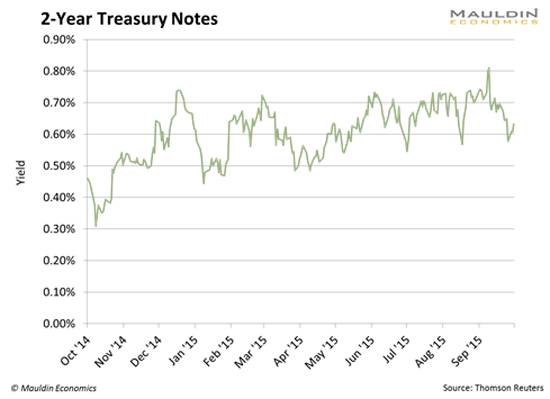
And stocks…
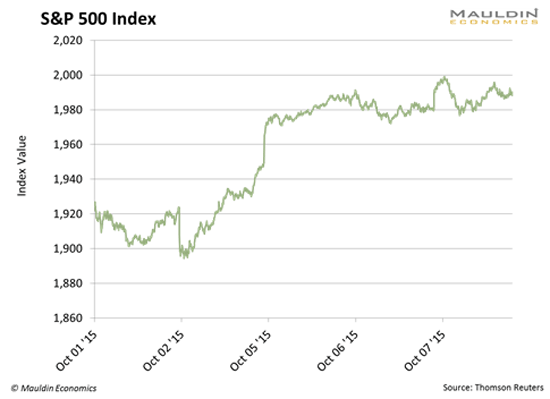
It wasn’t hard to identify the consensus thinking. As usual, it was wrong.
Operant Conditioning
The Bank of Japan is likely to quantitatively ease again, now that the Fed is not hiking. Now the Bank of England might not raise rates until 2017. Suddenly, we are once again in a world awash with liquidity. Gold is up quite a bit, and silver up even more (disclosure: I am long both gold and silver in a variety of forms, including GLD and SLV).
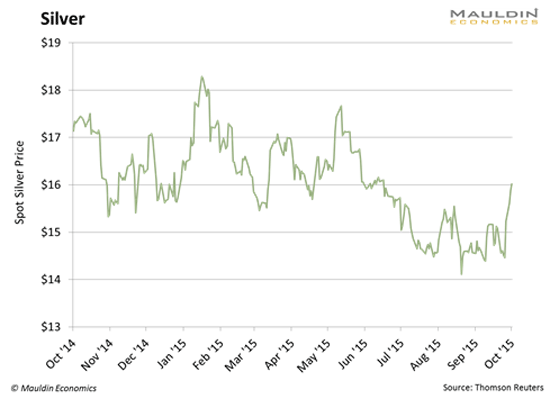
Wouldn’t it be interesting if we got a big precious metals rally? That would blow apart consensus thinking.
The dominant investment thesis is that a stronger dollar will murder emerging markets. What if that turns out not to be true? What if the dollar doesn’t strengthen, or all currencies weaken equally (relative to hard assets)?
This short EM trade is so old and so tired that people will stubbornly cling to it for the next six months, even in the face of overwhelming evidence to the contrary.
We’re not altogether different from the pigeons in B.F. Skinner’s box. If you could make money by pushing a button, how many times would you push the button?
Or: if you stopped making money by pushing the button, how long would you continue to sit there and push the button like an imbecile?
Inquiring minds want to know.

Jared Dillian
If you enjoyed Jared's article, you can sign up for The 10th Man, a free weekly letter, at mauldineconomics.com. Follow Jared on Twitter @dailydirtnap

